Berlin was at a disadvantage. That’s where we were heading after four surprisingly sunny, whirlwind days in London. I feared that the Germany half of our December trip, organized to use soon-to-expire hotel points, would be a disappointment. And I knew that part of the problem was my stereotype of Germans.
In London we ate pappadums and paisam with Sankar’s cousin and family. We strolled along the Thames with old friends, Matthew and Louise, photographing landmarks such as, “the walkie talkie,” “the cheese grater,” and “the London Eye.” At the British Library, we peered at manuscripts ranging from the Magna Carta to Paul McCartney’s jotted Yesterday lyrics.
I thought ahead to Berlin. I’d long perceived German people as stern and humorless. Exacting, and demanding. Waiting for an Agatha Christie play to start on our last evening, I commented to our friends, with only a bit of hyperbole, “I’m afraid I’m going to do something wrong in Germany. I’ll break a rule or something, and people will yell at me.”
“I don’t think so,” Matthew replied
As we carried our suitcases through Paddington Station the next day, I felt the kind of fatigue that indicated a cold was coming on.
My Stereotype of Germans Goes Way Back
I’d spent just one day in Germany over twenty years ago, and had no significant interactions with Germans. But back in the eighties I’d spent a year working for a German boss who was temperamental and disapproving. I’d found German foods—sauerkraut, dumplings, pickles—lacking.
I also have a kind of psychological back story with Germany. I guess every American does. Although the country has done an admirable job of reconciling its 20th century history, how can it counteract the near-continuous onslaught of Holocaust-related books, films, and television programs? It can’t. I’d been saddened and horrified more times than I could count.
Thus, my perception of Germans. I had actually been known to proclaim that I had no interest in visiting Germany. It’s not difficult to make that kind of statement at age 64, because there are so many countries to visit and so little time.
One thing I never did, however, was connect my proclamations about Germany with my irritation over the question, “Aren’t you afraid to visit Turkey?” that Sankar and I receive whenever we travel to that country.
So why, then, did Sankar and I choose Berlin over, say, Bruge or Amsterdam? Well, we felt Berlin was a cosmopolitan “world city,” with fascinating Cold War and World War II sights. A place we really should see. We also knew Berlin had a Turkish neighborhood that might evoke the wonderful years we spent in Turkey. And I think a tiny part of me knew that my stereotype of Germans was ridiculous, and that it was time to challenge it.
A Rainy Start
It was drizzling when our plane landed in Berlin. We caught an Uber to our hotel, just three blocks from the Reichstag. The city appeared spread out, almost suburban. The Tiergarten, adjacent to our hotel, looked more like a forest. Aside from the regal Brandenburg Gate, most buildings appeared modern and undistinguished. They reminded me, disappointingly, of downtown Minneapolis. War—and the Soviet emphasis on functionality—had apparently erased most of Berlin’s charm.
A Worldly New Friend
We checked into a comfortable hotel room at the Marriott. There was a coffeemaker on the side table, but no water bottles, a nice nod to the environment. When we visited the lobby for information, the concierge, to our surprise, was a slim, neatly groomed Turk named Oğuzhan. We were so happy to meet someone from Turkey that we greeted him like an old friend.
Oğuzhan told us he had grown up in Germany, his parents Gastarbeiters, guest workers, who arrived over fifty years ago. When we lived in Turkey, I met several offspring of Gastarbeiters. My elegant supervisor, Dilek, fluent in Turkish, German, and English. Several 3M Turkey wives, well-educated and secularly inclined; their mothers had worn the headscarf, but they did not. One, an engineer, worked for a German company that sold chemicals to Iran, which she told us was the makeup capital of the world. “I go there every month.”
Oğuzhan was warm and eager to help, hardly my stereotype of Germans, and I realized with some envy that growing up trilingual would make a person quite cosmopolitan. He smiled when we told him we had, several years ago, spent a night in his ancestral town of Afyonkarahisar.

Oğuzhan gave us a map of a dozen or so Berlin Christmas markets, and we walked to the nearest one, in Gendarmenmarkt Square. Gendarmenmarkt contains the 19th century Berlin concert hall and the 18th century French and German churches, all of which, I later read, were restored after the Second World War. In the center of the square stood several dozen holiday shops in white tents with pointed tops. Some had open sides, but many were enclosed by clear plastic, and even heated. Shopping delights beckoned.
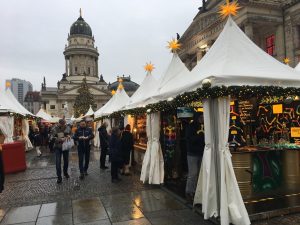
Christmas Galore
Gendarmenmarkt stores were bursting with colorful ornaments, wooden candle carousels of all sizes, leather wallets and purses, hats, gloves, scarves, and hard candies in long, pointed cellophane bags. Close to a dozen establishments offered refreshments: glühwein, various bratwursts including “currywurst,” which sounded slightly alarming, and dishes involving noodles, potatoes, and pork. I was curious, but not quite ready to dig in.
History Lessons
Over the next two days, we walked through the extensive and up-to-date German History Museum. We learned that Germany prior to unification under “Iron Chancellor” Otto von Bismarck, wasn’t much more than a disparate collection of provinces, each with its own ruler. After an hour and a half, which brought us up to the twentieth century, we sat down for tea in its formal, but somehow cozy café.
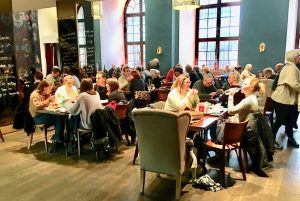
The next day we visited the Pergamon museum, located on an island in the Spree river. It was a dazzling (but shameful) collection of artifacts from other lands, including the gates of Babylon and the market gate from Miletus, a Roman site in western Turkey.
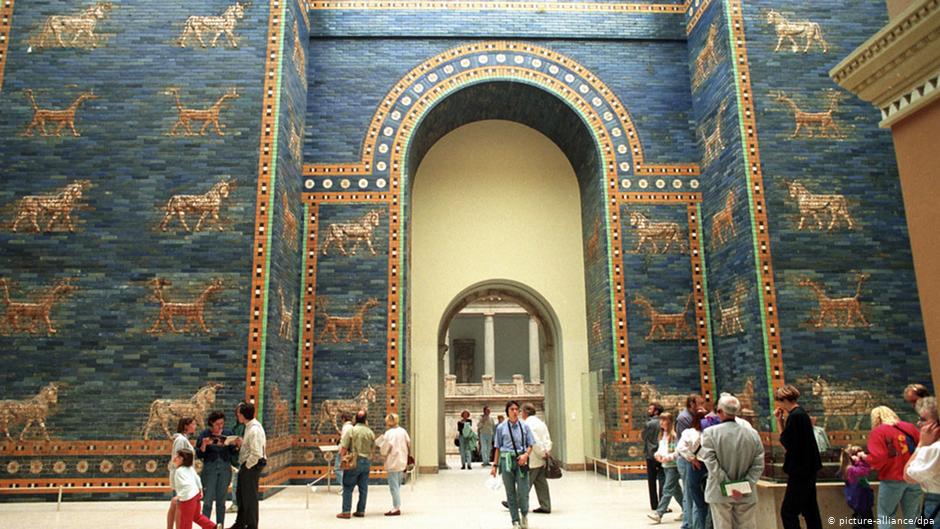
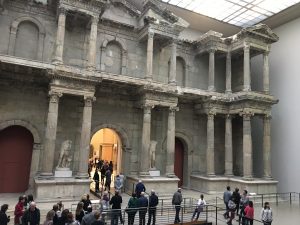
Nearby was “Pergamon Museum. The Panorama.” This new site featured a three-story, multimedia diorama that put viewers in the middle of the ancient Roman city. With dramatic background music and evocative lighting, we watched Romans emerge from their homes at sunrise, worship at temples, shop at agoras, and gather to view performances in the evening. It was a don’t-miss experience.

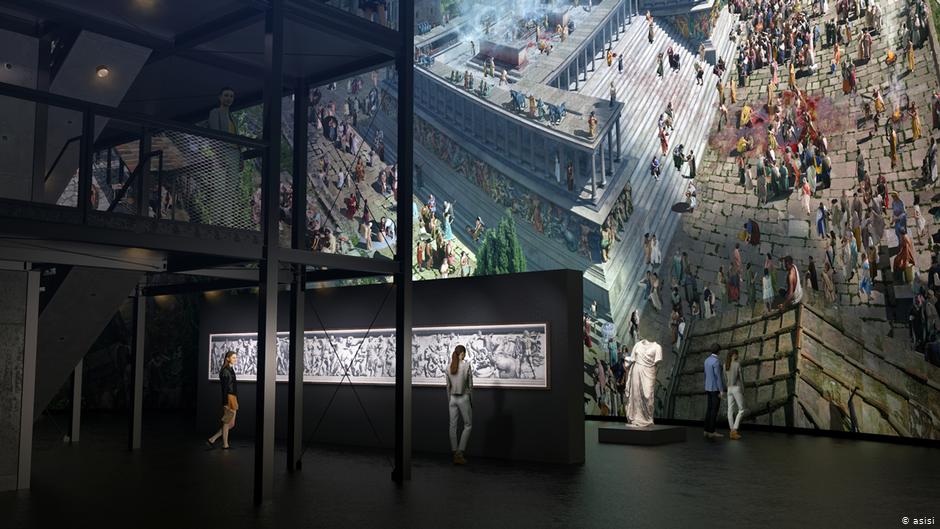
On our last day, we toured the Berlin Wall Memorial, a sober, informative remembrance strung out along a quarter mile stretch of former Wall.
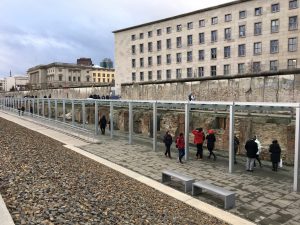
Tall, sometimes slightly plump, but rarely fat, Germans dressed in earth tones, wearing sensible shoes and warm-looking jackets. They appeared casual, confident, and unpretentious. I felt the comfort of looking similar in appearance, something I’ve missed in our travels to Latin America, southern Europe, and Asia, where Sankar has blended in.
It was odd, but as soon as I arrived in Germany, I got so caught up observing and interacting that my stereotype, alive for years, seemed to exit my mind. It was like when you imagine a place, but find that when you get there, the old image becomes difficult to recall. New impressions were quickly writing over my old ones.
Patriotic Immigrants Were Not my Stereotype of Germans
We climbed into an Uber early one day with, “Good morning,” only to hear an emphatic “Guten tag,” from the driver. This was the one and only reprimand we received in Berlin, and it was given by a Turk. A recent arrival, he told us in Turkish that he liked Berlin, particularly its manageable size and ease of getting around, and jotted down for us the name of a popular restaurant in Kreutzberg, the Turkish neighborhood.
A-a-a-choo!
The rain kept falling and my cold kept getting worse. Sankar and I both felt tired, and with no social engagements, we found ourselves dozing off in mid-evening and sleeping late in the morning. That felt good, but we were wasting precious sightseeing time.
We had forgotten to bring decongestants, so we stopped at a pharmacy. The woman at the counter was the pharmacist herself, and to my surprise, I had her attention for more than five minutes. “How much congestion do you have?” “Do you have a cough?” “Would you describe it as a lot, a little or not at all?” “Do you want to take something dissolved in water, or would you prefer a pill?” Again, not my stereotype of Germans. The Grippostad she sold me for less than $10 made me feel a bit better, though I longed for Sudafed.
A Splurge
The night after our Gendarmenmarkt visit, I woke several times, thinking about a small black purse I’d seen there. The leather on one of its sides had been worked into a lovely flower shape. We went back to the market and ended up buying it. The vendor was also the artist, one Karin Scholz, from Dusseldorf, her card read, perhaps fifty years of age. After we finished the transaction, to my astonishment, she came out of her booth and gave me a long, tight hug.
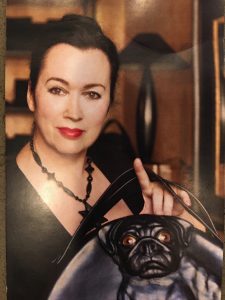
Seeking a light lunch, we sat down at a picnic table in a market café warmed by heating lamps, and ordered noodle soup. We were surprised to find ourselves beside four travelers from Guatemala, and enjoyed a lengthy Spanish conversation.
We returned to the market another day, this time for chocolates and candle holders. After making our purchases, we sat down in another café, whose menu highlighted goose products, and ordered potato soup. It came full of various herbs and weiner slices, delicious, but not overly fatty. It was only 2:00 pm, but daylight was fading. We lingered in the warmth of the cafe, feeling a glow of companionship with the other patrons.

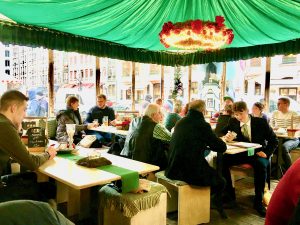
Unexpected Kindness
The Marriott charged thirty Euros for breakfast, so each morning we headed to a coffee shop across the street from our hotel, whose counter displayed a tantalizing array of pastries. I can say that German croissants are every bit as good as French ones. On our second morning, with no hint of their availability. Sankar asked if they had eggs. I was a little surprised he’d asked (but it didn’t occur to me to wonder that he—or we—would get yelled at). The young clerk admitted that they did have eggs. In just a few minutes a plump, beaming Fraulein emerged from the back kitchen and placed in front of him a generous plate of scrambled eggs topped by herbs and accompanied by a green salad.
It was pouring the afternoon of the weekly market in Kreutzberg so, sadly, we gave up on visiting the Turkish neighborhood. Late that afternoon, the sky still dark, we were resting in our hotel room. We had 5:30 Reichstag reservations, made online back home, which had generated official-looking confirming paperwork. But we couldn’t motivate ourselves to put on our rain gear and venture out.
We didn’t even want to leave our hotel, so for dinner we decided to splurge at our hotel’s “American-style Steakhouse.” The menu was limited and expensive, and the waiters a bit snooty, but I was able to order barbecued pork ribs (I think pork is on every menu at every meal in Germany) and Sankar a ribeye. After our food was served, we were surprised by a visit from another smiling Fraulein, whose job seemed to be to make her way around the restaurant asking every diner how they liked their food. She was delighted when we told her we were pleased.
Debriefing
Our Berlin guidebook opens with the phrase, “Berlin is a city of leafy boulevards.” It goes on to say that, “Berliners love to hang out in parks and along riverbanks, as if enjoying a continuous open-air party.” Clearly, the city is at its best in warmer weather, and I don’t really recommend it in the winter. For Christmas markets, we might have chosen a smaller, more picturesque German city or town, although we probably would have experienced rain there as well.
Back home, my cold lingering and combining with jet lag, I slowly completed my Christmas shopping and house decorating. I didn’t download my photos for a couple of weeks, nor did I reflect on my travels. But then a friend asked, “How was Berlin?” and my quick answer, “Fine. The people were really nice, friendly and helpful,” made me realize that my perceptions had changed.
Immersion—even one as brief and lackluster as our four rainy, half-sick days—had produced positive emotions—gratefulness, warmth, feelings of connection and inclusion. And these emotions had replaced my stereotype!
Everything, it seems, boils down to emotions. And now I began to understand “Aren’t you afraid to go to Turkey?” It’s a stand-in for emotions surrounding decades of sad and horrifying news from the Middle East. But it is also changeable.
Over our three years in Turkey, we hosted 26 visitors. Some hesitated to make the trip. But as they left, they all had the same comment. “Wow! What a great place!”
For additional reading about Berlin, go to: https://www.fodors.com/world/europe/germany
For more on unexpected kindness, go to: https://suesturkishadventures.com/unexpected-kindness/
For more on stereotypes, go to: https://suesturkishadventures.com/perceptions-and-illusions/
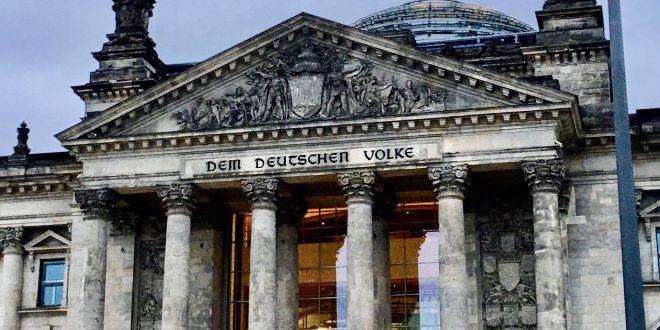
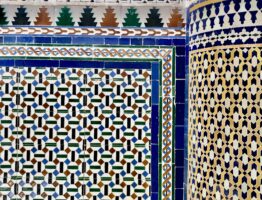

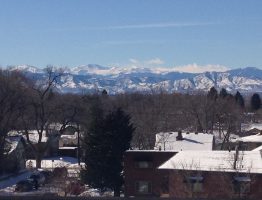
Great insight, Sue!